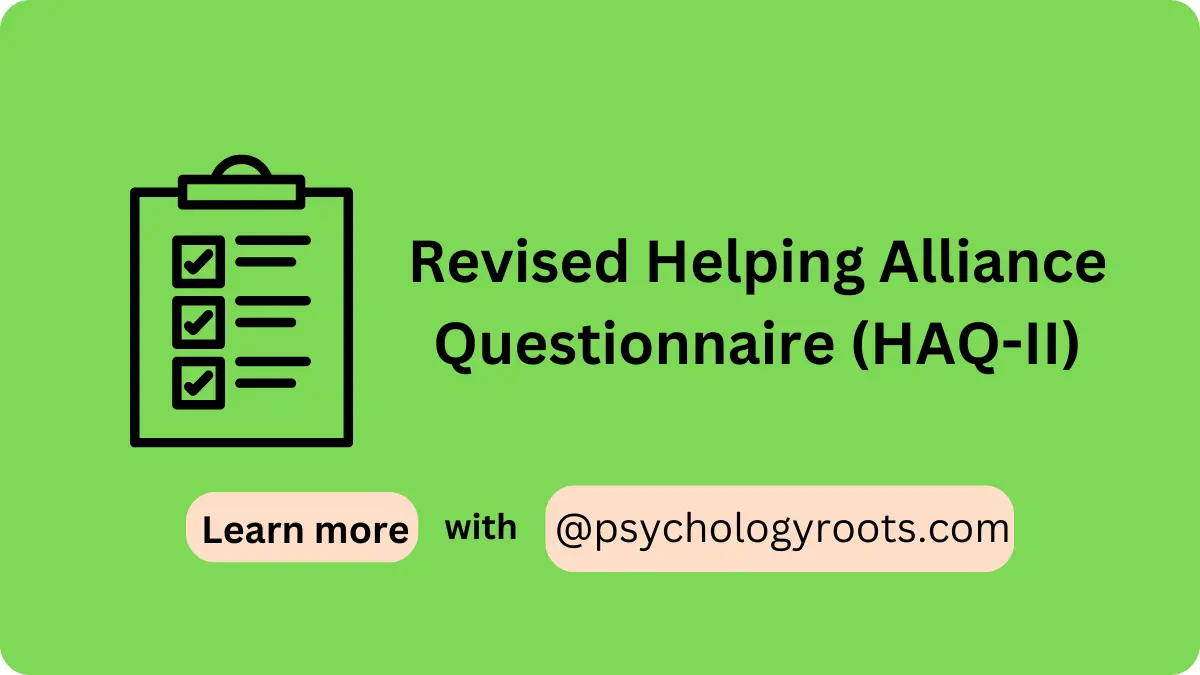Table of Contents
Revised Helping Alliance Questionnaire (HAQ-II)
Here in this post, we are sharing the “Revised Helping Alliance Questionnaire (HAQ-II)”. You can read psychometric and Author information. We have thousands of Scales and questionnaires in our collection (See Scales and Questionnaires). You can demand us any scale and questionnaires related to psychology through our community, and we will provide you with a short time. Keep visiting Psychology Roots.
About Revised Helping Alliance Questionnaire (HAQ-II)
Scale Name
Revised Helping Alliance Questionnaire (HAQ-II)
Author Details
L Luborsky, J P Barber, L Siqueland, S Johnson, L M Najavits, A Frank, D Daley
Translation Availability
Not Sure

Background/Description
The Revised Helping Alliance Questionnaire (HAQ-II) is a widely used instrument that measures the therapeutic alliance between clients and clinicians. Originally developed to improve the understanding of how the therapeutic relationship influences treatment outcomes, the HAQ-II has been adapted for various clinical settings, including individual therapy and counseling. The tool emphasizes the collaborative and affective bond between the client and therapist, which is considered essential for effective therapeutic work. Its revised format improves clarity and effectiveness in measuring both the client’s and therapist’s perception of their alliance.
Administration, Scoring and Interpretation
- Explain the purpose of the questionnaire to both clients and therapists, emphasizing that responses should reflect genuine experiences and perceptions.
- Ensure confidentiality and create a comfortable setting to encourage openness.
- The HAQ-II consists of items rated on a Likert scale, covering aspects like trust, empathy, and collaborative goal-setting.
- Both clients and therapists complete the questionnaire independently to assess alignment in their perception of the therapeutic relationship.
Reliability and Validity
- Reliability: The HAQ-II has demonstrated high internal consistency, making it a reliable measure for assessing therapeutic alliance across different sessions and settings.
- Validity: The questionnaire is validated through empirical studies showing strong correlations between alliance scores and treatment success, establishing its efficacy in clinical research and practice.
Available Versions
19-Items
Reference
Luborsky, L., Barber, J. P., Siqueland, L., Johnson, S., Najavits, L. M., Frank, A., & Daley, D. (1996). The Revised Helping Alliance Questionnaire (HAq-II) : Psychometric Properties. The Journal of psychotherapy practice and research, 5(3), 260–271.
Important Link
Scale File:
Frequently Asked Questions
What aspects of the therapeutic relationship does HAQ-II measure?
The HAQ-II assesses trust, empathy, collaboration, and mutual understanding between the client and therapist.
Who can administer the HAQ-II?
It can be administered by clinicians, therapists, and researchers working with clients in therapeutic settings.
How frequently should the HAQ-II be administered?
It can be used periodically during treatment to monitor alliance progress, typically at the start, midpoint, and end of therapy.
Is the HAQ-II suitable for all types of therapy?
Yes, it is applicable to various therapeutic modalities, including individual, couple, and family therapy.
How can therapists use HAQ-II results to improve treatment?
By identifying clients’ perceptions, therapists can adapt their approach to strengthen rapport and address any alliance challenges.
Disclaimer
Please note that Psychology Roots does not have the right to grant permission for the use of any psychological scales or assessments listed on its website. To use any scale or assessment, you must obtain permission directly from the author or translator of the tool. Psychology Roots provides information about various tools and their administration procedures, but it is your responsibility to obtain proper permissions before using any scale or assessment. If you need further information about an author’s contact details, please submit a query to the Psychology Roots team.
Help Us Improve This Article
Have you discovered an inaccuracy? We put out great effort to give accurate and scientifically trustworthy information to our readers. Please notify us if you discover any typographical or grammatical errors.
Make a comment. We acknowledge and appreciate your efforts.
Share With Us
If you have any scale or any material related to psychology kindly share it with us at psychologyroots@gmail.com. We help others on behalf of you.